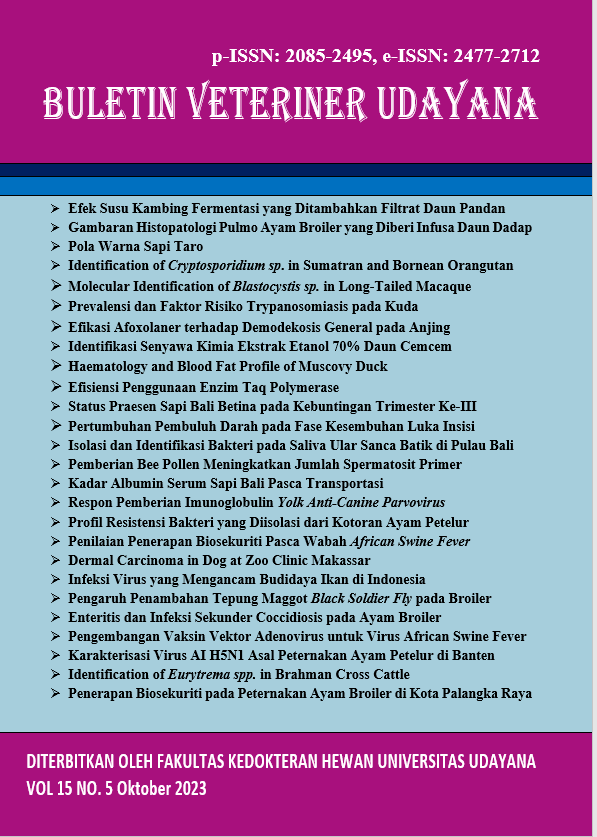IMPLICATIONS OF FULFILLING ANIMAL WELFARE AND ANIMAL PROTECTION DUE TO SPECIESIST AND ANTHROPOCENTRIC BELIEFS
Abstract
Every year, billions of animals are slaughtered on industrial agricultures and animals whose status does not include under the category of protected animals and stray dogs or cats are subjected to various kinds of abusive behavior by human as a result of the moral exclusion of animals of certain species. The idea of speciesism and anthropocentrism causes suffering on a massive scale that people may find hard to fathom. This paper discusses the definition of speciesism, anthropocentrism and its impact on advocacy for farm animals, stray animals and wild animals that are not protected by law, which begins with an explanation of how animals stand before the law and how society practices the concept of speciesism and anthropocentrism which has an impact on animal welfare. Then, identify how speciesism and anthropocentrism affects the protection of animals classified in certain species as a result of unfavorable protection or treatment for the animals. The position of animals that are still categorized as property by the law makes it difficult to apply animal protection for certain species of animals and for them who do not have owners. This condition occurs because the definitions of animals included in various existing laws are not in line with the clauses in the articles that should protect certain animal species as stated in the definitions in the regulations. In addition, there is a strong belief that certain species of animals such as the wildlife animals which are legally protected, companion animals (i.e. dogs and cats) and animals whose owned by people are more deserving of protection than other animal species and for non-owned animals. At the end of writing, this paper examines how the concepts of speciesism and anthropocentrism, which are unfavorable treatment or consideration towards those who are not categorized as the human and towards certain animal species which often become victims of speciesist and anthropocentric ideas have an impact on animal law protection.
Downloads
References
Animal Ethics Organization. Speciesism. https://www.animalethics.org.uk/anthropocentrism.html [Accessed 1 December 2022]
Coffey R. 2022. What Is Anthropocentrism? Definition, Roots, and Environmental Implications. https://www.treehugger.com/anthropocentrism-definition-environmental-implications-5204180 [Accessed on 25 November 2022].
Effective Altruism Handbook. 2020. The Case Against Speciesism. https://forum.effectivealtruism.org/s/HKybonRPkBdXMDxLY/p/XyZCnYMyxfEbtEKRq [Accessed 30 November 2022]
Food and Agriculture Organization. 2022. Crops and Livestock Products. https://www.fao.org/faostat/en/#data/QCL [Accessed 30 November 2022]
Francione, Gary L. 1996. Animals as Property. https://www.animallaw.info/article/animals-property [Accessed 25 November 2022]
Francione, Gary R Garner. 2010. The Animal Rights Debate, Abolition or Regulation?, Columbia University Press, New York
Horta O. 2010. What is speciesism?. J. Agric. Environ. Ethics. 23: 243-266.
Kopnina H, Haydn W, Bron T, John JP. 2018. Anthropocentrism: More Than Just a Misunderstood Problem. Journal of Agricultural and Environmental Ethics. 31st Ed. Pp: 109-127.
Goralnik L, Nelson MP. 2012. Encyclopedia of applied ethics. 2nd Ed.
Orzechowski K. 2022. Global animal slaughter statistics and charts. https://faunalytics.org/global-animal-slaughter-statistics-charts-2022-update/ [Accessed 29 November 2022]
Government Regulation of Indonesia Number 95 of 2012 concerning veterinary public health and animal welfare.
Ryder RD. 2010. Speciesism again: The original leaflet. Crit. Soc. 2: 1–2.
Sanders B. 2018. Global animal slaughter statistics and charts. https://faunalytics.org/global-animal-slaughter-statistics-and-charts/ [Accessed 28 November 2022]
Singer P. 1975. Animal liberation: a new ethics for our treatment of animals. New York. Pp: 302.
Singer P. 2009. Speciesism and moral status. Metaphilosophy. 40th Ed. Pp: 567-581.
Satya T. 2014. Workshop penguatan hukum kesejahteraan hewan. https://www.slideshare.net/Naipospos/workshop-penguatan-hukum-kesejahteraan-hewan18-maret-2014 [Accessed 30 November 2022]
The Case Against Speciesism. https://centerforreducingsuffering.org/sentience-politics-series-introduction/the-case-against-speciesism/ [Accessed 1 December 2022]
United Nation Environment Programme. 2020. Preventing the next pandemic. Zoonotic diseases and how to break the chain of transmission. Kenya. Pp: 13.
Act of The Republic of Indonesia Number 41 of 2014 Amendment on the Amendment of Law Number 18 of 2009 concerning Farming and animal health
Act of Republic of Indonesia Number 5 of 1990 Concerning Conservation of The Living Natural Resources and Its Ecosystems.
Yu, Zihao. 2021. Speciesism in Animal Law. https://www.ialasia.org/projects/speciesism-in-animal-law [Accessed 28 November 2022].





